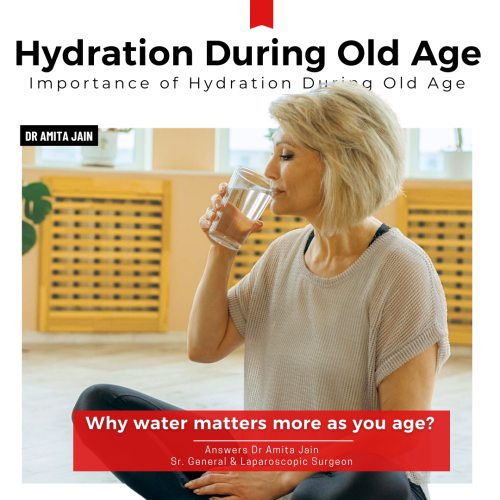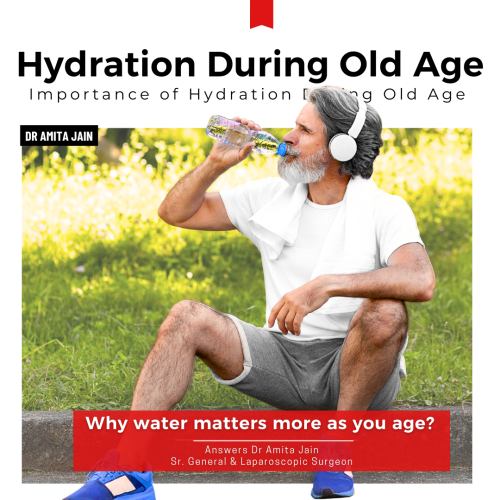Importance of Hydration During Old Age Decodes Dr Amita Jain who is the Leading General and Laparoscopic Surgeon
Water is the essence of life, forming the foundation of every function in the human body. While staying hydrated is crucial at every age, it becomes even more critical as we grow older. The aging process brings a range of physical and physiological changes that increase the risk of dehydration — often without noticeable symptoms until it’s too late.
As a result, many older adults unknowingly suffer from chronic dehydration, which can lead to serious health complications. Understanding why water matters more with age can help seniors and caregivers take proactive steps toward better health and well-being. India’s top general and laparoscopic surgeon Dr Amita Jain shares the factors.

What is the importance of hydration during old age?
Reduced Thirst Sensation – As we age, our body’s ability to sense thirst diminishes. This means older adults may not feel thirsty even when their bodies are in need of water. Relying solely on thirst cues can lead to inadequate fluid intake, making it essential to build a conscious routine around drinking water.
Changes in Kidney Function – The kidneys play a vital role in maintaining fluid balance. However, with age, kidney function naturally declines, reducing the body’s efficiency in conserving water. This makes older adults more prone to fluid loss and increases the need for consistent hydration to support proper kidney function and toxin removal.
Impact on Cognitive and Physical Health – Even mild dehydration in seniors can lead to confusion, dizziness, fatigue, and difficulty concentrating. It can also mimic or worsen symptoms of dementia. Staying hydrated supports cognitive function, helps maintain energy levels, and reduces the risk of falls caused by dizziness or imbalance.
Medication Side Effects – Many older adults take medications such as diuretics, laxatives, or treatments for blood pressure and heart conditions. These can increase water loss through urine or sweat, making it more important to replace lost fluids through regular water intake.
Skin and Joint Health – Hydration is key to maintaining skin elasticity and joint lubrication. Dehydrated skin can become dry, flaky, and more prone to injury. Adequate water intake helps maintain healthy skin and can ease joint stiffness, especially in conditions like arthritis.
Digestive and Urinary Health – Water aids digestion and prevents constipation — a common issue in older adults. It also supports urinary tract health by flushing out bacteria and reducing the risk of urinary tract infections (UTIs), which are more prevalent in seniors.
Temperature Regulation – Older adults have a lower ability to regulate body temperature. Hydration helps maintain proper body temperature and reduces the risk of heat-related illnesses, especially during warmer seasons.
Tips to Stay Hydrated in Old Age
- Keep a water bottle nearby and sip throughout the day.
- Eat water-rich foods like fruits (watermelon, oranges) and vegetables (cucumbers, tomatoes).
- Set reminders or use hydration apps to track water intake.
- Opt for flavored water or herbal teas if plain water is unappealing.
- Monitor urine color — pale yellow usually indicates good hydration.
Hydration is not just a health tip — it’s a necessity, especially during old age. With age-related changes impacting thirst perception, kidney function, and medication use, seniors need to make water intake a daily priority. A well-hydrated body supports clearer thinking, better mobility, stronger immunity, and an overall improved quality of life. So, raise a glass — to aging gracefully and healthfully, one sip at a time.

Dr Amita Jain, one of the most experienced General and Laparoscopic Surgeons in Delhi, is widely recognised for her expertise in hernia, piles, gallbladder, fissure, and fistula surgeries. With an outstanding career spanning over 29 years, Dr Amita Jain has earned her place among the top General and Laparoscopic surgeons in Delhi and India, known for her precision, compassion, and consistent surgical excellence. She was the Professor of Surgery at the Army College of Medical Sciences and Base Hospital, Delhi Cantt. In 1994, she was commissioned as a surgeon under the United Nations Mission in Congo.
Dr Amita Jain currently serves as the Head of Department and Senior Consultant for General, Laparoscopic and Trauma Surgery at Artemis Lite Hospital (Delhi), Rosewalk – Luxury Maternity Hospital in Delhi and Rainbow Children Hospitals (at Malviya Nagar and Panchsheel Park, New Delhi)
Dr Amita Jain has successfully performed a wide range of complex general surgeries, including both open and minimally invasive procedures, with a strong focus on trauma care, onco-surgical techniques, and reconstructive surgeries. Her medical specialisation includes – Gallbladder surgeries, appendix removal surgeries, hernia repair surgeries, Pilonidal Sinus treatments, varicose vein and piles surgeries, fistula surgeries and fissure surgeries.
Dr Amita Jain has also authored some of the key medical journals and publications, like ResearchGate, IJSR
Note: the articles are written with Dr Amita Jain’s professional insights and referring to her medical publications.
